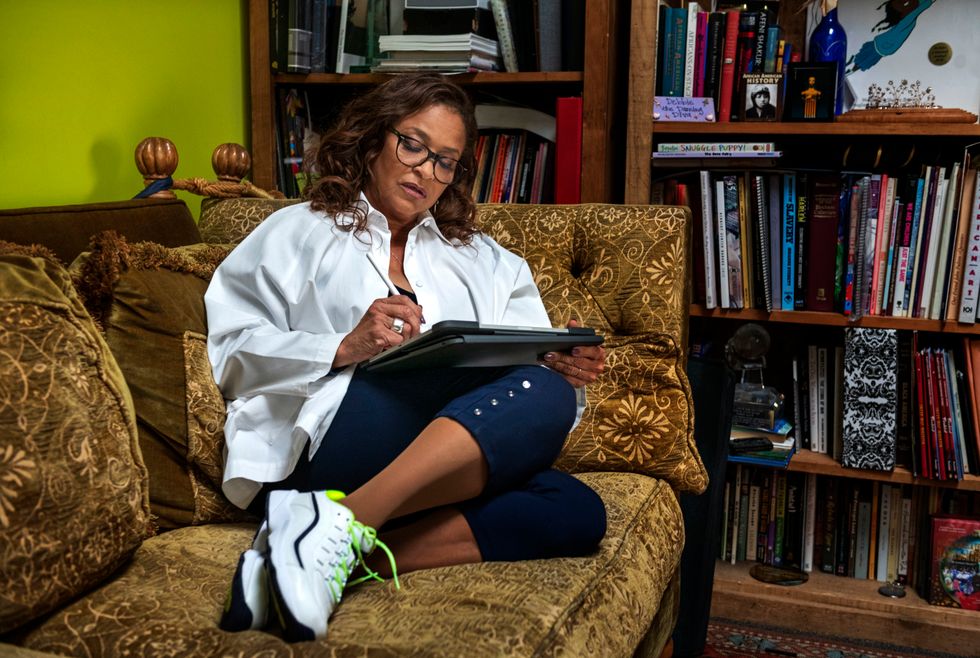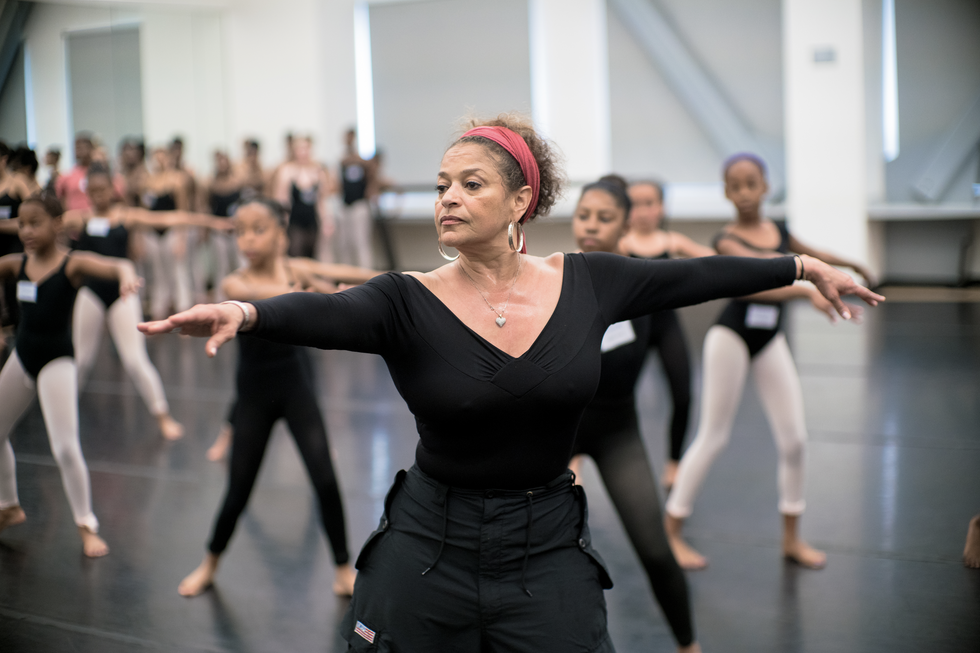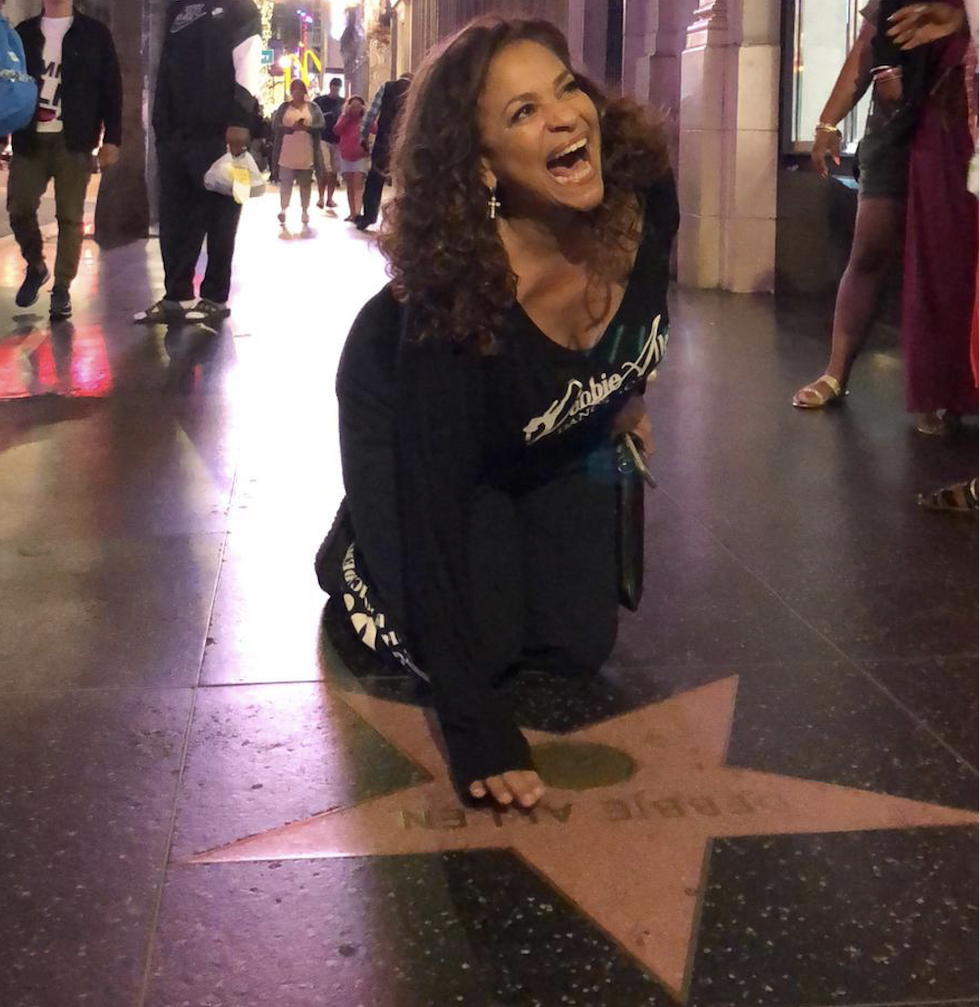Debbie Allen Never Stops Pushing—Or Inspiring
There may be no more iconic opening montage in all of dance TV history than Debbie Allen as Lydia Grant on “Fame.”
“You’ve got big dreams. You want fame,” she tells students at the fictional NYC High School for the Performing Arts. “Well, fame costs. And right here is where you start paying—in sweat.”
Allen herself knows a thing or two about fame. In the four decades since Fame hit the big screen, Debbie Allen, now 70, has become an icon. But she’s paid her dues, not only as a dancer and choreographer, but as an actress, director, producer, cultural ambassador, educator and NAACP Image, Emmy and Golden Globe award winner.
“She is the quintessential renaissance woman,” says tap star Jason Samuels Smith, who founded the tap program at her Debbie Allen Dance Academy. Smith notes that Allen’s work has had such a broad reach, he isn’t sure that Allen can even fathom her impact on audiences. “She does so much work that some job she thinks is insignificant can change someone’s life.”
Despite all her high-profile Hollywood gigs—which currently include appearing in and executive-producing “Grey’s Anatomy” and acting on “S.W.A.T.”—Allen still spends significant time in the studio, teaching and mentoring dancers directly.
A video of her coaching young dancers at DADA last year went viral. The tough-love speech she gives sounds eerily like…Lydia Grant: “Don’t be compromised by anyone at the front of this room who tells you you can’t!” she yells, barefoot and dressed in loose-fitting dance attire. “I’m telling you that you can. What am I telling you? That you can!”
Why is mentoring so important to her, after all the success she’s had?
“Because I’m still that little girl who wanted to be a ballerina who couldn’t go to the ballet school because they weren’t accepting black kids,” she says.

Allen was denied entry to the Houston Foundation for Ballet (now the Houston Ballet School) because of her race. A year later, in 1960, her mother, Pulitzer Prize–nominated poet Vivian Ayers, moved the family to Mexico, where there were fewer racial barriers. “She inspired us to go beyond ourselves and be children of the universe,” Allen says.
They returned to Houston a few years later and, in 1964, Allen reauditioned for the Houston Foundation for Ballet and was admitted. (In the years since her first attempt, a grant from the Ford Foundation helped spur the school to reconsider its practices.) However, this meant that at 14, Allen single-handedly began desegregating the organization.
Still, a ballet career wasn’t a viable option as a black woman at the time. After graduating cum laude from Howard University, where she studied theater and classics, Allen started out on Broadway, earning her first Tony nomination for West Side Story, then became a household name when her role in the Fame movie became a central character in the subsequent TV series.
She soon began working both behind the screen and in front, starting with her role choreographing for “Fame.” She ended up producing blockbusters like Amistad, and directing episodes of TV shows like “The Fresh Prince of Bel-Air.”
Allen’s visibility as a black woman has had a monumental impact on dancers of color everywhere. The tap legend Dianne Walker told Smith that Allen was the first black woman she had ever seen tap dancing on television. “What she endured as a black woman to get this far is so inspiring,” adds Chloe Arnold, artistic director of Syncopated Ladies. “But she didn’t sit on her success. She has endlessly shared it with others.”
Allen established the Debbie Allen Dance Academy in 2000. The school offers open classes in 10 styles, a professional-caliber training program, scholarships to 160 kids a year, classes for seniors, cancer patients, battered women and their children, and the new Sons of DADA program, just for young men.
And next year, thanks to “Grey’s Anatomy” executive producer Shonda Rhimes, DADA is moving to what will be a state-of-the-art space. (Rhimes quietly bought a building and gifted it to Allen.) It’s inspired by Alvin Ailey’s building in New York City—what Allen calls “the palace”—and will house five large studios, dressing rooms and a performance space. They broke ground in March, with plans for a spring 2021 opening.
“When you talk about arts education,” Allen says, “you’re talking about character building, discipline, creativity, finding your own voice, innovation. The arts teach tolerance because there is no one way of doing anything. The modern world wants you to turn in, the ballet world wants you to turn out, the hip-hop world wants you to turn upside down.”
It’s not just technique that Allen demands her students understand; it’s the origins and history of these forms. Her musical theater students, for instance, need to pass a test before performing in the concert—who are Sondheim, Bernstein, Taymor, Fosse, McKayle?

But Allen’s reach goes far beyond DADA’s walls. She has personally mentored countless young dancers, who are now part of what she calls the “DADA diaspora”: her daughter, Vivian Nixon; Chloe and Maud Arnold; Jason Samuels Smith; and Corbin Bleu, just to name a few. Her former students can be found on Broadway, on tour with Beyoncé, on TV, in movies, in commercials and performing all over the globe.
“She has an eye and a spirit to see people’s inner potential and bring that out,” says Chloe Arnold, who first met Allen at 14, and performed in her production of Brothers of the Night at the Kennedy Center at 16. When the tap dancer graduated from Columbia University, Allen told her to come to L.A.—and offered her a room in her house to make it possible. Allen gave Arnold jobs teaching at an outreach program, producing shows for DADA and working in the office. Later she let Arnold follow her around on TV sets. “I went to Debbie Allen graduate school, which was beyond priceless,” Arnold says.
Smith adds that she handed him the keys to DADA to hold tap jams every Monday night when he first moved to L.A. “She basically said, ‘Close up when you’re done.’ I built a company from that.”
Allen served as a cultural ambassador for the United States, as a member of the President’s Committee on the Arts and Humanities, representing dance under George W. Bush, and has spoken to congressional groups in Washington about the vital role the arts play in our lives.
“What would the quality of your life be if we took all the paintings off the wall?” she asked the Congress members. “If you had to turn off the TV because that’s writing and acting; if you had to turn off the radio, so there was no music? If there were no rugs under your feet? What would the quality of your life be? Civilizations are remembered for their art and for their war. And we have a big enough footprint with our war. We need to do something else.”

As giving as she is, she expects a lot out of everyone in her orbit. “It’s a pain in the ass to work with her,” says “So You Think You Can Dance” executive producer Nigel Lythgoe, who is collaborating with Allen on the upcoming Los Angeles International Dance Festival. “She’s relentless, which works for me, thank goodness, because I am too.”
This April, the first biannual Los Angeles International Dance Festival will take over the city and stretch down into Orange County. It was born spontaneously, at the end of a panel discussion at the Wallis Annenberg Center for the Performing Arts, with some of the leading figures in the L.A. dance scene—Allen; Lythgoe; philanthropist Glorya Kaufman; Ben Johnson, director of performing arts for the Los Angeles Department of Cultural Affairs; and choreographer Lula Washington, who joined in from the audience.
Allen had long been inspired by a festival she’d attended in Brisbane, Australia, where every venue in the city was putting on something and the city was alive with art. “Why don’t we have this in L.A.,” she wondered aloud, “the capital of the entertainment business?”
The team came together quickly—sometimes meeting at 5 am because it was the only time their schedules converged—and has managed to gather some of the biggest names in the dance world out West. On the roster: Syncopated Ladies, Savion Glover, Lula Washington Dance Theatre, BODYTRAFFIC, Ailey II, Bollywood Boulevard, Ate9, Versa-Style Dance Company and more. Stars from “So You Think You Can Dance,” “Dancing with the Stars” and “World of Dance” will perform in an evening together. There will be daily classes, workshops, a flash mob in Union Station and free outdoor events.
“Debbie’s pressure and enthusiasm drove it from the beginning,” says Lythgoe. “It wasn’t ‘Can we do this?’ It was ‘We’re coming back next Sunday to plan.’ ”
Allen continues to move seamlessly between worlds. In addition to choreographing a piece for this year’s Grammys—which featured Misty Copeland dancing with the DADA Ensemble—she will continue working on “Grey’s Anatomy” and “S.W.A.T.” She also directed Netflix’s upcoming Christmas on the Square, starring Dolly Parton, Jenifer Lewis and Christine Baranski.
How does all her training in dance inform her work in TV and film? “In the dance world you’re always acting,” she says. “You don’t have words, you have your face and your body.”
Even her work behind the camera becomes a dance. “One time I was directing ‘Scandal’ and there were nine people in one scene in Olivia Pope’s office. I said, ‘You go here and when he comes here you turn around and then you have to get this file out…’ When I finished the broad strokes of the blocking, Kerry Washington yelled out, ‘It’s choreography!’ ”
This ability to navigate different parts of her career only serves to inspire others. “Seeing her go from being a dancer and performer to being a producer and director is huge for dancers,” says Smith. “It allows us to envision doing both.”
It is unclear where else Allen has to go—what other challenges does she have left to conquer? “I don’t know what else she can do,” Smith says, “but if someone’s going to take dance to space, it will be her. She’ll be producing or directing or starring in it, too.”



